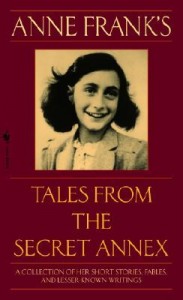 Growing up as a Jewish girl, of course I knew about Anne Frank’s diary. I read it for the first time when I was in the 4th grade. When my parents gave me a diary for Chanukkah that year, it made sense that I should call my diary Kit (a thinly veiled homage to Anne’s journal, Kitty).
Growing up as a Jewish girl, of course I knew about Anne Frank’s diary. I read it for the first time when I was in the 4th grade. When my parents gave me a diary for Chanukkah that year, it made sense that I should call my diary Kit (a thinly veiled homage to Anne’s journal, Kitty).
I re-read Anne’s diary in high school and was cast in the role of Anne in my high school drama class’ reading of the play. I’ve white-knuckled and bawled through the 1959 film version of The Diary of Anne Frank several times. I’ve read numerous biographies of Anne Frank as well as, Anne Frank Remembered, the astonishing memoir by Meip Gies, one of the Frank family’s protectors.
When I had an opportunity to visit Amsterdam for the first time, David and the kids and I made the pilgrimage to the Anne Frank House.
With all that I knew or thought I knew, I had no idea Anne Frank wrote fiction. Last week, when I discovered that was the case, I ran out and borrowed our library’s copy of Anne Frank’s Tales of the Secret Annex: A collection of her short stories, fables, and lesser-known writings.
Some of the writing is very strong and some is on the level you’d expect from a 13 or 14 year old, which is what she was when she wrote it. But obviously Anne Frank had a literary gift. Part of it was a natural way with words and a clear confidence in her ability to express herself creatively. Another part was her deep insight into human emotions and behavior.
For example, in her story “Eva’s Dream” (1943) Anne writes of the complex inner workings of girls’ friendships. In the story, Elf (a wise being), helps the young Eva understand why one of her classmates, the beautiful, wealthy (mean girl) Leentje, wields such power over the rest of them. Even more impressive, Anne Frank explains (through Elf) how social courage and compassion can transform malice into camaraderie.
Elf enlightens Eva in this passage: “If (Marie) were to stand up to her, Leentje would soon have all the other girls on her side. She’d point out that Marie is ugly and poor. The rest of you would do whatever Leentje tells you to because you know she’ll be mad at you if you don’t, and that you’ll never be able to get in her good graces again. And in your eyes, being out of your ringleader’s good graces is almost as bad as having the principal mad at you. You wouldn’t be allowed to go to her house anymore, and the rest of the class would ignore you. Later on, girls like Leentje will find themselves alone, because when the other girls are older they’ll turn against her. But Eva, if you were to do that now, Leentje would have an oportunity to change before she winds up being alone for the rest of her life.”
“Should I try to get the other girls to stop listening to her?” Eva asked.
“Yes. She’ll be angry and indignant at first. But once she realizes why you’re doing it and understands her own behavior better, she’ll be grateful and will have more genuine frineds than she’s ever had before.”
Seventy years later, this online teen adviser couldn’t have said it better.











